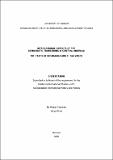| dc.contributor.author |
Miguel Carreras |
| dc.coverage.spatial |
Switzerland |
| dc.date.accessioned |
2016-01-07T15:26:47Z |
| dc.date.available |
2016-01-07T15:26:47Z |
| dc.identifier.uri |
http://desa1.cejamericas.org:8080/handle/2015/2205 |
| dc.description.abstract |
This study argues against of the premises of the transition paradigm, viz. that it is fruitless to look for international factors contributing to the collapse of authoritarian regimes. On the contrary, we show that internal dynamics alone are insufficient to explain democratic transitions in Central America, and we present the numerous international factors that contributed to regime change. Our work uses case studies of two democratic transitions in Central America that took place at the beginning of the 1990s: Nicaragua and El Salvador. We show that the international dimensions of the democratic transitions in these two countries are visible at every stage of the process. |
| dc.language.iso |
English |
| dc.title |
International Aspects of the Democratic Transitions in Latin America |
| dc.ceja.source |
Fuente: University of Geneva, Graduate Institute of International and Development Studies |

